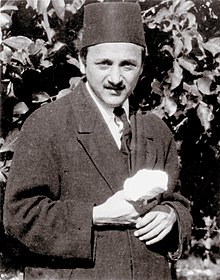
Back Shoghi Effendi Afrikaans شوقي أفندي Arabic Şövqi Əfəndi Azerbaijani Шәүҡи Әфәнде Bashkir شۆقی ئەفەندی CKB Shoghi Effendi Czech Shoghi Effendi German Shoghi Effendi Rabbání Esperanto Shoghi Effendi Spanish Shoghi Effendi Basque
Shoghi Effendi | |
|---|---|
شوقی افندی | |
 Effendi in Haifa, 1921 | |
| In office 1921–1957 | |
| Preceded by | ʻAbdu'l-Bahá |
| Succeeded by | Universal House of Justice |
| Personal | |
| Born | Shoghí Rabbání 1 March 1897 Acre, Ottoman Empire (now Israel) |
| Died | 4 November 1957 (aged 60) |
| Resting place | New Southgate Cemetery, London 51°37′26″N 0°08′39″W / 51.6240°N 0.1441°W |
| Religion | Baháʼí Faith |
| Nationality | Iranian |
| Spouse | |
| Parents |
|
| Lineage | Afnán (see: § Ancestry) |
| Relatives | ʻAbdu'l-Bahá (grandfather) Baháʼu'lláh (great-grandfather) |
| Signature |  |
| Part of a series on the |
| Baháʼí Faith |
|---|
 |
Shoghí Effendi (/ˈʃoʊɡiː ɛˈfɛndi/;[a] Persian: شوقی افندی; 1 March 1897[b] – 4 November 1957) was an Ottoman-born Iranian religious figure and the Guardian of the Baháʼí Faith from 1921 to 1957.[3] As the grandson and successor of ʻAbdu'l-Bahá, he was responsible for creating a series of teaching plans that oversaw the expansion of the Baháʼí Faith to a number of new countries, and also translated many of the written works of crucial Baháʼí leaders.[4] Upon his death in 1957, the Hands of the Cause, which included his Canadian wife Rúhíyyih Khánum, took on the role of overseeing the transfer of the religion's supreme legal authority to the Universal House of Justice, which has held elections every five years since 1963.[4]
Effendi, an Afnán, was born Shoghí Rabbání in Acre,[3][c] where he spent his early life, but later went on to study in Haifa and Beirut, gaining an arts degree from the Syrian Protestant College in 1918 and then serving as ʻAbdu'l-Bahá's secretary and translator.[5] In 1920, he attended Balliol College, Oxford, where he studied political science and economics, but his second year was interrupted by ʻAbdu'l-Bahá's death, which led to his appointment as the Guardian of the Baháʼí Faith at the age of 24.[5][6][3]
For 36 years, Effendi spearheaded the effort to grow and protect the religion globally. He sent out more than 17,500 letters, mostly in Persian and English, directing and keeping up with the progress of existing Baháʼí communities, responding to their persecution across the Middle East, coordinating teaching efforts, and building up the Baháʼí World Centre in and around Haifa.[6][5] He appointed 32 living individuals (and 10 posthumously) as prestigious Hands of the Cause,[7] and also presided over the community's enlargement from 1,034 localities in 1935 to 2,700 localities in 1953 and further to 14,437 localities in 1963.[6] From the beginning to the end of his leadership, the total population of Baháʼís around the world grew from 100,000 to 400,000 people.[8]
Among the Baháʼí community, Effendi is commonly referred to as simply "The Guardian" in honour of his unique role as the only Guardian in the history of the Baháʼí Faith.[5][9] His works are all published under his chosen title Effendi, as opposed to his birth name Rabbání. He is buried at New Southgate Cemetery in the city of London.
Cite error: There are <ref group=lower-alpha> tags or {{efn}} templates on this page, but the references will not show without a {{reflist|group=lower-alpha}} template or {{notelist}} template (see the help page).
- ^ Rabbani 1957.
- ^ Giachery 1973, p. 205.
- ^ a b c Momen 2011.
- ^ a b Hartz 2009, p. 13.
- ^ a b c d Smith 2000.
- ^ a b c Hartz 2009, pp. 78–85.
- ^ Smith 2000, pp. 175–177.
- ^ Hartz 2009, pp. 79, 85.
- ^ Adamson 2009, p. 201.